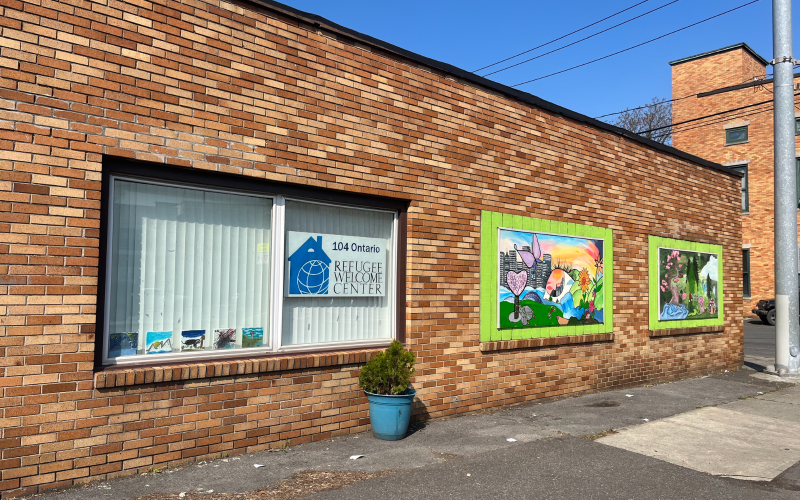Public Health Student Works “Glocally” to Improve Health and Nutrition of Refugees

ALBANY, N.Y. (May 12, 2023) — Through the School of Public Health’s Glocal Initiative, two undergraduate students recently interned at the West Hill Refugee Welcome Center in the Capital Region, where they worked to help improve the health and nutrition of Afghan, Sudanese and Burmese refugees.
Since 2005, over 4,500 refugees have settled in New York’s capital region, and the West Hill Refugee Welcome Center helps with welcoming those settling in the West Hill community, connecting them with support services, resources and safe housing.
Public health major Samantha Guerra recently completed 108 internship hours at West Hill, working on various initiatives, including nutritional promotion and workshops to discuss incorporating more fruits and vegetables into diets. She notes that it was a very educational experience to work with immigrant and refugee families, and allowed her to learn from the community directly.
“Through interning at West Hill Refugee Welcome Center, I got to know the families on a personal basis while applying concepts I was learning in the classroom,” says Guerra. “It was exciting—yet sometimes challenging—to connect with the families past the language barrier. Many of the mothers especially are still learning English and so trying to come up with programs that took this into account meant that we had to get creative.”
As a child, Guerra’s family moved frequently, and she saw firsthand what it was like to live with different populations and communities within the Northeast. This sparked her interest in public health and how communities are impacted by world events, and through her internship, she has enjoyed learning more about the struggles and the perseverance of those who come to the U.S. from abroad.
“There was one time where I was helping one of the little boys that came from Burma with this homework at the center,” Guerra says. “I had been working there for two months at the time and thought that I had a good grasp of each family, where they came from, and some of their experiences. However, as I was helping with his homework, the boy started telling me how much he missed living in Indiana, and before that Chicago, and before that Burma. He was only eight years old, and to have moved around that many times really put into perspective how difficult it can be for refugees—particularly children.”
Guerra notes that the experience was very eye-opening and enabled her to work with global populations she is interested in serving—without having to go abroad.
“My supervisor taught me so much and ended up writing me a letter of recommendation for the Peace Corps,” she explains. “I’m excited to share that I am continuing on the path of community work and involvement through volunteering in the fall as a community health facilitator with the Peace Corps. This internship has helped to prepare me for that experience.”
The internship grew out of a collaboration between UAlbany’s Center for Global Health and the West Hill Refugee Welcome Center, which began when West Hill presented during a meeting hosted by the Returned Peace Corps volunteers of Northeastern New York that focused on refugee resettlement in Upstate New York.
“I was intrigued by West Hill’s vision and model, which in part involves fixing up neighborhood abandoned and vacant buildings as a means of providing affordable housing for the refugees,” John Justino, director of the Center for Global Health explains. “When we started working on the Pilot Glocal Initiative at the School of Public Health, one of the first tasks in our action plan was to identify and reach out to refugee resettlement agencies in the area who may wish to collaborate and West Hill seemed like a great potential partner.”
Justino connected with the West Hill Refugee Welcome Center, and after visiting the center and meeting with staff, it was determined that hosting School of Public Health undergraduate students at the Refugee Welcome Center was mutually beneficial.
“We’re looking forward to further collaborations with the West Hill Refugee Welcome Center to provide our students with hands-on learning right here in the Capital Region,” says Justino. “In fact, we already hosted a ‘glocal day of service’ during National Public Health Week last month at the Center, and over a dozen students participated.”


